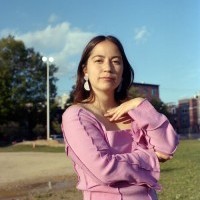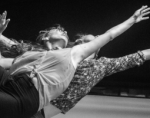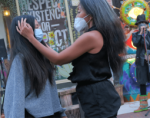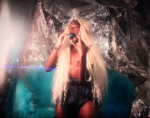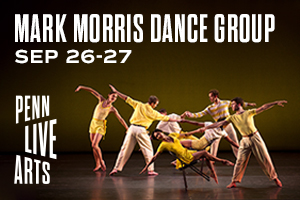
Taylor Mac: Distilling the Past to Imagine a Future
by Maddie Hopfield
In a quest to reach new audiences for performing arts in Philadelphia, Theatre Philadelphia and thINKingDANCE are joining forces and exploring how dance writing and discourse can provide new perspectives on theatre. Beginning May 2018, tD writers will be lending their varied backgrounds, interests, and approaches to criticism to professional works of theatre in Philadelphia. Let us know what you think in the comments!
“I wanted to make a piece that’s so long I could never do it perfectly … but we have to use our humanity to get through it.”
Twenty-four hours. A full day spent collectively laughing at, listening to, dancing through, and all-in-all living in Taylor Mac’s performance-art marathon: a world that features an unabashed queering and deconstruction of American history, a happening that Mac refers to as a “radical faerie realness ritual sacrifice,” which New York Times reviewer Wesley Morris called “one of the great experiences of my life.” When I finally got over the initial question of how, logistically, this could be done (answer: everyone works really, really hard), I got to witness what happens when artistic genius meets good funding.
Before the show, queers of all ages gathered, clad in colorful outfits and drag, as a Rocky-Horror-Picture-Show breed of excitement filled the Merriam Theater lobby, a presentation of the Philadelphia International Festival of the Arts (PIFA). “A 24-Decade History of Popular Music” took place on two days (12pm to 12am, for two consecutive Saturdays), and, as in all of its previous iterations, it set out to cover one decade of American history per hour, from 1776 to the present day.
Each period’s music was performed by Mac and a plethora of badass musicians. With each hour’s passing, a different musician left the stage, and another spectacular outfit was draped over Mac by the show’s costume designer, Machine Dazzle. Songs ranged from tunes like “Yankee Doodle Dandy” and “I’ve Been Working on the Railroad” to works by Nina Simone and David Bowie; from minstrel songs to musical numbers; from war ballads to Mac’s own compositions. In total, 246 songs streamed from judy’s (Mac uses “judy” as a gender pronoun) impeccably tuned vocal cords, lyrically accurate every time.
Bursting forth between each song was the delicious wit of Mac, who gave us historical information mixed with musing, imagining, glitter, sexual innuendo, and personal anecdote. Assisted by the dolled up “dandy minions,” a group of performers who roamed the theater to dance, writhe, strip, and pass out relevant props to audience members, we spilled through Common Sense and the temperance movement while drinking and simulating beer pong with strangers from the audience. We spent an entire hour listening to Mac while blindfolded; we saw a deconstructed version of The Mikado set on Mars, acted out by a few shy audience members; we stood in line for rations of soup during the Depression; we practiced subtle, sultry stares to our lovers across imagined courtyards in Jewish tenements. Then we carried two enormous inflatable penises (one decorated with stars and stripes, the other featuring a hammer and sickle) into battle during the Cold War; and as the white flight phenomenon took over the country, all the white audience members were asked to flock to the “suburbs”—the seats furthest from the center of the theater.
This work made a deep impression, left in the sands of my cultural understanding, of what an American history education can look like in relation to the body. As a dancer and someone who has consistently struggled to visualize history, Mac’s use of audience participation or, more broadly, active bodies—often in service of inviting discomfort rather than shying from it—offered a humorous and unique example of experiential history. I thought of José Esteban Muñoz’s statement that “Queerness is ... performative because it is not simply a being but a doing for and toward the future,” and understood that, for Mac, looking backward was an integral part of actively creating that queer future. The work embodied notions of ever-becoming, re-working, deconstructing, and reconstructing, a practice toward re-imagining how things could be.
Mac was willing, as a gay white performer, to both give space and attack the inhumane aspects of American history. For instance, after dressing in kimono-like garb and singing from the musical The Mikado, judy met the ensuing applause with backlash. “Don’t applaud that, don’t applaud that!” judy shouted, before explaining the background of the musical further (and proceeding to re-set it on Mars). There were many similar moments in which we, the audience, were made vulnerable, made to taste and sit with our privilege or uneasiness.
And, in the 23rd hour (decade: the ’90’s), we got to see Mac do the same. The hour was dedicated to radical lesbian songs, with all the lesbians in the audience invited to sit onstage. They spent the hour in a tailgating party of sorts, eating hot dogs and drinking beer provided by the dandy minions while Mac’s voice, slightly deteriorating by this point, belted out songs like “Pussy Manifesto” and “Butch in the Streets.” As the women filed offstage, Mac made a joke about the lesbians in the L.A. audience whispering to one another onstage—maybe they’d all slept with one another or maybe they were “just networking”—to which one of them yelled, “Don’t end with sexism!” judy responded, “You’re right, thanks for calling me out!”
There are many shows where vulnerability and f*cking up are not to be expected from either performer and audience, but this isn’t that show; there might be a show where old songs with racist or sexist backstories would be avoided, but here, they were sung, acknowledged, shattered.
As the closing song drifted over us like a reverie, a spotlight glinted off the sequins on Mac’s dress, creating rays of light radiating outward: a majestic, three-dimensional halo. Every so often, one of the light beams would shoot you in the face, causing temporary blindness—the perfect mixture of beauty and humor, transcendence and humanity. An outpouring.
The title of this piece is taken from Jose Esteban Munoz’s, “Cruising Utopia,” in which he writes, “We have never been queer, yet queerness exists for us as an identity that can be distilled from the past and used to imagine a future.”
To join the conversation, follow thINKingDANCE and Theatre Philadelphia online and on social media to read, share, and comment.
Taylor Mac, A 24-Decade History of Popular Music, Merriam Theater, June 2-9
By Maddie Hopfield
June 19, 2018

